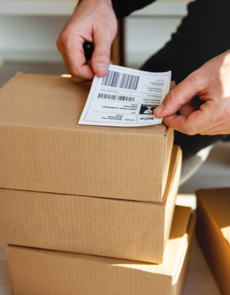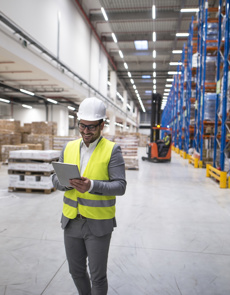How Blockchain is Transforming OMS, Inventory & Supply Chain
Rarely does a technology come along that truly changes the way we build trust and transparency in our businesses. Blockchain tech is one of them.
The global blockchain supply chain market was valued at approximately $2.26 billion in 2023 and is projected to reach $95.3 billion by 2034, growing at a compound annual growth rate of 44.5%.
But what is blockchain?
Blockchain initially gained traction as the technology that made cryptocurrencies such as Bitcoin possible, but its uses are now everywhere. We rely on blockchain applications redefining industry sectors beyond finance for logistics, supply chain management, and business systems like order management systems (OMS) or inventory management systems (IMS).
Basics of Blockchain: How it Works
Unlike a traditional database that keeps all of the data in one place, blockchain holds identical copies of its digital ledger on a network of computers. One block is built for every transaction. All blocks are then cryptographically linked together, without the need for a “central” authority such as a bank (as is the case with the fiat money system). This makes it almost impossible to change historic data on one block without the whole network noticing.
One of the central advantages that flows from blockchain’s design is its immutability: once a transaction is added, you can never change or delete it. This establishes a tamper-proof historical record on which all permissioned parties (like suppliers, 3PLs, and retailers) can rely. Since all participants see the same, up-to-date data, there’s much less risk of errors, fraud, or disputes over inventory and order transactions.
When enterprises juggle complex supply chains, blockchain provides an extra layer of data accuracy and consistency. Everyone operates from a single source of truth, which lets you track products, confirm deliveries, and address issues as soon as they happen. This transparency and dependability make it easier to do business with and to foster trust from all parties involved.
Key Features of Blockchain Technology in Supply Chain
Blockchain helps address key supply chain management issues by introducing transparency, decentralisation, security, traceability, and immutability:
- Transparency: Everyone involved has visibility into the same real-time data. Months later, you’ll deal with fewer errors and arguments over inventory levels.
- Decentralisation: Information is stored on a distributed database not owned by anyone. Outside parties can’t manipulate the records and you’ll lower the risk of unauthorised changes to stock or miscounts.
- Security: Transactions are secured and saved forever, shielding OMS/IMS operations from fraud and data breaches.
- Traceability: Each transaction is time-stamped and logged, allowing for easy tracking of products and issues, such as lost shipments or supply chain blind spots.
- Immutability: Once in the system, you can’t change or erase information. This maintains an unbroken chain of the truth that stakeholders trust and facilitates prompt resolution of disputes between supply chain participants.
Together, these simplify supply chain processes, ensure that data is accurate, and create a more predictable and reliable environment for everyone.
The Role of Blockchain in Supply Chain Management
Blockchain is now part of many OMS and IMS solutions.
For instance, in IMS platforms, when stock reaches a certain level, smart contracts can automatically place orders. For OMS tools, these smart contracts then confirm that goods have been dispatched or received, without requiring manual intervention, minimising the risk of errors or penalties.
Enhancing Traceability and Transparency
Blockchain’s auditable and immutable ledger also provides complete traceability for every product shipment. In an OMS, this is real-time accuracy for order activity, and in an IMS, it’s seen in the ability to track stock details historically and at a batch level.
Many companies are already ahead of the game in this regard.
Walmart’s implementation of blockchain to trace food has cut the time to trace the origin of a package of mangoes from seven days to 2.2 seconds. This reduced the number and speed of recalls and increased the safety and trust in food products.
Improving Efficiency and Reducing Costs
Automating transactions via smart contracts results in efficient processes that can minimise human intervention before shipment tracking. For instance, a smart contract can automatically execute a payment and update an inventory record when customers receive a shipment. No manual paperwork also means shorter time for processing delays.
This accelerates operations and reduces errors (not to mention costs). When all parties share real-time data, everyone operates off identical information and won’t have to deal with unnecessary delays and errors.
Businesses can use this advantage to claim up to a 20-30% reduction in the costs of their supply chain and an 85% faster processing of documentation brought in by blockchain solutions.
Real-Time Tracking Capabilities
Supply chain operations move faster when data is shared in real time and automation comes in to take over the remainder of the process.
With a distributed ledger, everyone can immediately get information on inventory, shipments and transactions instead of waiting for reports from siloed databases or manual reports. With smart contracts coded directly into the blockchain, they’ll automatically execute actions, such as payments or shipment releases, minimising human mediation and quickening transaction times.
Examples of Use of Blockchain in Supply Chains
Let’s look at a couple of blockchain order management examples from large organisations to understand their own peculiar processes:
Nestlé: Tracking Food From the Farm
Nestlé has been at the forefront of using blockchain to promote transparency in their supply chain and responsible sourcing. Nestlé, in collaboration with OpenSC, launched a pilot where consumers can follow products like New Zealand milk to Middle Eastern factories on the blockchain all the way to the source. This transparent system allows for validated information to be recorded on sustainability and sourcing, helping individuals make informed purchasing decisions.
Nestlé has also employed IBM Food Trust to trace ingredients in items such as Gerber baby food and Zoégas coffee, offering ready access to information on harvests, processing, packaging and shipping. Consumers can see their coffee beans’ journey from the farm, the harvest date, into their cup, simply by scanning a QR code on Zoégas coffee. Such traceability not only gives customers confidence in the ethical sourcing of the product, but also enables Nestlé to act quickly on any food safety or quality problem.
Walmart: At the Forefront of Food Traceability
By adopting blockchain technology, Walmart has established a global standard for food safety and traceability. Using the Hyperledger Fabric platform, Walmart has cut the time to track the origin of products such as sliced mangoes in its US stores to 2.2 seconds from nearly a week.
This fast traceability is essential for swiftly identifying and isolating affected products during food safety events, which in turn reduces consumer risk and minimises expensive recalls.
In China, Walmart uses blockchain to monitor pork, uploading certificates of authenticity to guarantee that the product is genuine and to restore confidence in a market prone to past issues of supply chain credibility. Through 2018, Walmart's blockchain system was tracking more than 25 products from several suppliers, such as leafy greens, dairy and seafood, providing visibility from farm to shelf.
Blockchain's Impact on Supply Chain Businesses
Blockchain promises more than improvements to processes and cost savings. It also leads to more informed decisions, fewer disputes, fewer risks, and more agile/efficient operations. This is particularly important for rapidly expanding multi-channel organisations whose growing global supply chain complexity demands access to real-time analytics and more:
- Building trust with tamper-proof records - For audits and dispute resolution, immutability can be invaluable, since all parties can trust in a single, tamper-proof version of events and proof conditions as they existed during a particular action. So, if a shipment is delayed (or a product is returned), blockchain shows a clear history that’s useful for promptly settling disputes.
- Facilitating stakeholder communication - Information silos are common in traditional supply chains, with manufacturers, suppliers, 3PLs, and retailers all keeping their own records. This is a recipe for clear miscommunication and delay. Blockchain removes these hurdles by giving participants a common, shared, accessible place to pull data from.
- Encouraging cross-enterprise collaboration - Block by block, through a single source of truth, blockchain supports a strong collaboration between diverse systems and partners. Companies are already incorporating blockchain into their systems to link agriculture stakeholders for improved traceability, quality and just-in-time delivery.
- Enhancing data integrity and security - Decentralised and cryptographically secure, blockchain prevents fraud, safeguards sensitive transactions, and shields against cybersecurity threats. The right network will validate and encrypt every transaction, eliminating the possibility of unauthorised data manipulation.
Practical Applications of Blockchain in SCM
Here are a couple of practical blockchain supply chain use cases to consider incorporating into your own business:
Product Authentication and Quality Control
Brands can record origin and quality information to support compliance verification and even eliminate counterfeiting. For instance, you can automatically verify quality test results through smart contracts, so you’ll make payments only when quality standards are met.
Another benefit is the ability to track and trace at a much deeper level, leading to a reduction in recalls and higher levels of consumer trust. Research reveals blockchain can reduce food fraud and save the food industry $31 billion.
Sustainability Efforts and Environmental Impact
Green supply chains can keep track of carbon emissions and ethical material sourcing. Each supplier’s environmental actions (including emissions figures or sustainable supply chain information) can be recorded on-chain, creating a digital history you can use to base your compliance and reporting on.
Major brands such as Coca-Cola and Ford use blockchain to confirm ethical sourcing, while more regulators and consumers also ask for such heightened transparency.
Managing Supplier Relationships
Blockchain makes it easy to onboard suppliers, monitor their performance, and manage contracts by recording all interactions and agreements on a shared, tamper-resistant ledger. This eliminates some of the manual paperwork, gets onboarding moving more quickly, and creates a single source of truth.
Blockchain adoption strategies
Here are some blockchain and inventory management tactics that can be utilised:
Support scalability and interoperability
Select blockchain systems and solutions that can grow with your business and existing tools. Don’t hesitate to scale up when necessary so you can handle more transactions. Interoperability is another important factor in providing smooth goods/data exchange with partners, couriers, and other supply chain software.
Ensure a cost-effective Implementation
Start testing blockchain technology in targeted, high-impact supply chain workflows. Some use cases include product traceability, order confirmations, or supplier onboarding. As you scale and gauge results, you’ll identify new challenges and even develop in-house expertise without overcommitting resources.
Promote trust and collaboration
Ensure that suppliers, logistics providers, and IT teams are involved early to foster buy-in and an overall successful transition. For blockchain initiatives to succeed, focus on clear communication and setting common goals.
Addressing Challenges with Blockchain Implementation
Blockchain isn’t a plug-and-play fix. You need to put in the work to take full advantage of it.
Look for plenty of integrations with other systems
Integrating blockchain with older, traditional ERP, OMS, and IMS platforms can be a messy affair. These weren’t built to allow for a transparent data flow. Solutions designed API-first and with deep integration options, allow businesses to take a step into a new era of technology at a speed that suits them.
Stay compliant with regulatory requirements
The transparency and immutability of the blockchain may not be compatible with data privacy regulations like the GDPR and specific industry standards. For instance, the European Data Protection Board has published guidelines underlining the importance of cautious data minimisation and risk assessments to be made before adopting blockchain for personal data.
Manage your costs and resources
Adopting blockchain technologies and best practices can be costly as it requires heavy tool investment, trained staff, and a new set of change processes. While the upfront cost can be high, you’ll see the return on the investment over time through faster and more efficient operations, less administrative overhead, and clearer visibility into who’s doing what in a system.
Preparing for a Blockchain-Enabled Supply Chain
There’s a lot of potential for blockchain to revitalise supply chains through trust, traceability, security and the ability to share data across all partners. By tracking every purchase on a tamper-proof ledger, blockchain allows businesses to trace where goods come from and where they go, prevent fraud, and maintain data integrity.
With increasingly complex supply chains and higher customer expectations, you need to future-proof your operations.
Mintsoft’s order management software offers automation, real-time visibility, and full stock and order audit trails you need for all your warehouses and channels. While it’s data is not supported by blockchain technology, it still offers secure data storage, easy access and the power to truly use your data for good business decisions.
Recently added AI functionality, such as the Access Evo AI assistant – Copilot, you can interrogate your data through conversational prompts to get truly powerful insights. Find out how Mintsoft’s OMS can help you to create a more transparent and smooth supply chain.







